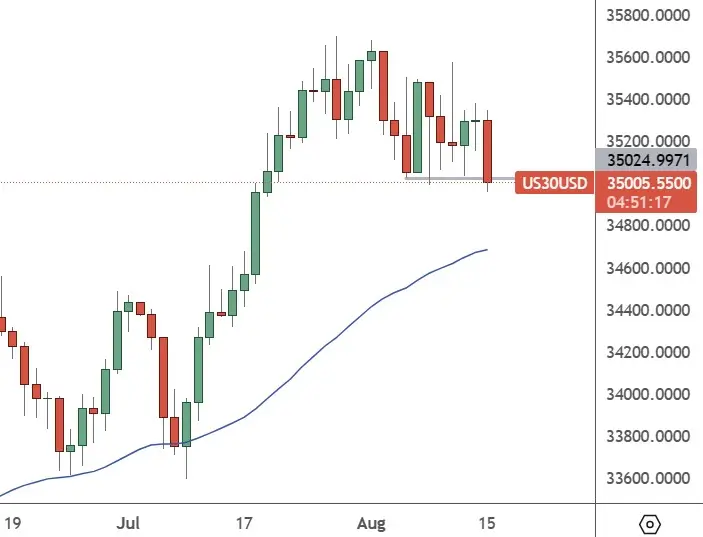The Dow Jones industrial average was hovering near a key support level as investors worried about global growth.

US30 – Daily Chart
The US30 index must hold above 35,000, or there is risk of a more significant correction.
The US market was unable to capitalise on strong retail sales, which came in at 0.7%, beating expectations of 0.4%. Lower inflation and consumer strength had painted a rosier picture for domestic demand, but external issues weighed on the market.
US futures fell as Treasury bond yields rose to yearly highs, as investors worried about China’s post-COVID recovery. PBOC officials reduced key interest rates, including the benchmark one-year bank lending rate, following softer data. However, the world’s second-largest economy is also facing a backdrop of property stress.
According to data released by the National Bureau of Statistics, China’s industrial output, retail sales, and investment all slowed more than expected in July, despite efforts to boost domestic demand. This comes on top of a whole host of weaker-than-expected data recently, prompting the People’s Bank of China to unexpectedly cut two key policy rates for a second time in three months.
The data showed that industrial output grew by 4.2% year-on-year in July, down from 4.8% in June. Retail sales rose by 3.3% year-on-year, down from 3.9% in June. And fixed asset investment grew by 6.1% year-on-year, down from 6.3% in June.
The slowdown in economic activity is likely due to a number of factors, including the ongoing trade war with the United States, a slowdown in global growth, and tightening credit conditions in China.
The People’s Bank of China’s decision to cut interest rates is an attempt to stimulate the economy and boost growth. However, it remains to be seen whether these measures will be enough to offset the headwinds facing the Chinese economy.
The central bank’s measures caused Asian stocks to fall, which had a negative impact on the European and US stock markets. The Chinese government also stopped publishing youth unemployment data, fearing it would further destabilise the market.
US Treasury yields are also increasing, with the Treasury planning to sell more than $103 billion in bonds this quarter and adding $132 billion in T-bill sales to the market yesterday.
A Fitch Ratings analyst informed CNBC that the agency might downgrade more lenders, including Wall Street titan JPMorgan Chase, while a proposed rule change by a top banking regulator added to investor concerns. Several worries are building after a big run-up in tech stocks this year, and investors should be prepared for a pullback.
According to a Bank of America survey of asset managers, who collectively manage $685 billion in assets, large investors are the least bearish in 18 months and are holding the lowest proportion of cash since November 2021. This was the previous market top when central banks began to withdraw their easy money policies. This could lead to further selling pressure in the market.